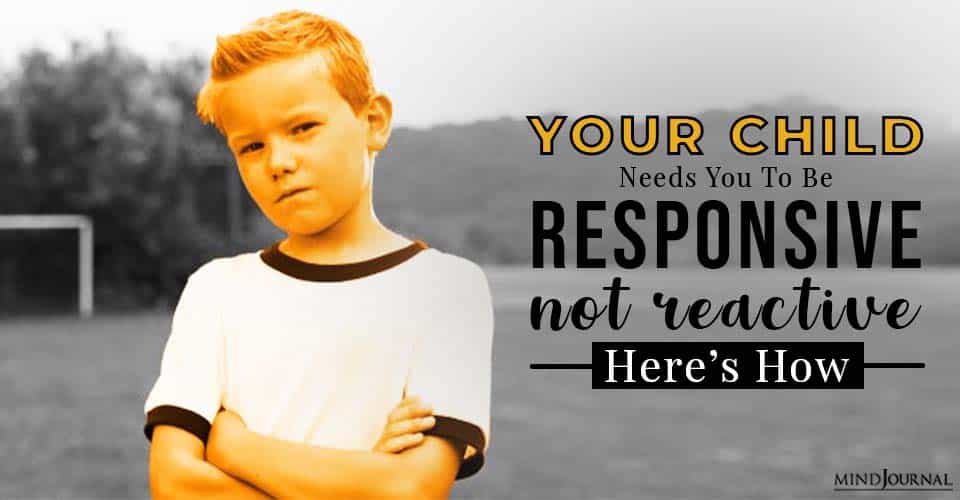What do you do when your child is not doing what’s expected? Do you react to your behavior? or respond?
Here’s why your child needs you to be responsive, not reactive and how can you do that.
Dev is trying to read books to his three-year-old, Zoara. Zoara is running around the room and not settling down to participate. She keeps demanding that mommy (Nurit) come back to read to her. Dev spends 20 minutes trying to get Zoara to change her behavior, then reaches his threshold and storms out of the room in frustration. Zoara starts to scream that she didn’t get her books and begs for Nurit who goes to Zoara, settles her down, reads to her, and puts her to bed. This has become a pattern: Zoara demanding mommy do bedtime every night and rejecting Dev.
Dev and Nurit know that this dynamic is unhealthy for everyone, but they feel stuck. Dev is so upset in the moment that it’s hard for him not to be reactive. For Nurit’s part, she has a hard time not going to Zoara when she’s screaming for her.
In my work collaborating with families to solve their most vexing child rearing challenges, I have identified a number of consistent parental mindsets that result in moms and dads getting triggered and reacting in ways that are ineffective and often increase the intensity and frequency of meltdowns, power struggles, and other challenging behaviors.
One of the most prevalent of these faulty mindsets is: “I can and need to control my child. I have the power to change his behavior.”
But the fact is that you cannot actually make your children do anything: eat, sleep, use the potty, be kind, not yell or have a tantrum. Children, like all humans, are the only ones who control their words and actions. This is one of the most humbling aspects of parenting that no one warns you about. It is so fiercely counter to how we see ourselves and our role. We are supposed to be able to make our children behave.
The problem is that when you focus your efforts on trying to make your child change his behavior, you actually put him in the driver’s seat. When you are in the position of trying to convince your child to cooperate with a direction or agree to a limit, you are actually ceding control of the situation to him.
Think about it, all of the typical tactics we use to try to get children to get with the program—logic (you’ll be tired in the morning if you don’t go to sleep right now), rewards/bribes (you’ll get an extra hour of screen time), or threats (you will lose screen time)—put the outcome in their hands.
What happens if your child isn’t swayed by your logic; if he doesn’t accept the bribe or reward or he doesn’t fear the threat? Your child remains in control of how the scenario unfolds and gets resolved, a dynamic that is infuriating to most parents and results in reactivity.
So you want to keep reminding yourself in these maddening moments to focus on what you do control—the situation—and not what you don’t control: your child.
Read How to Help Highly Sensitive Kids Manage Intense Emotions: 3 Tips
But it turns out that because you’re human, this is easier said than done. Even with this insight, if you are like most of the parents I work with, you get so triggered in the moment by your child’s defiance, sassiness or obfuscation that it is hard to think clearly and go through this reflective process. (I know this feeling all too well as I am a big reactor by nature and had a very hard time practicing what I preach.)

To help parents be more responsive vs. reactive at times when your child is not doing what’s expected, I have come up with a simple strategy to throw a monkey wrench into a downward spiral with your child: taking a mommy/daddy moment.
Here are the three key steps:
1. Matter-of-factly name the problem at hand:
“It’s time to get into the car seat but you are having a hard time following that direction.”
Read 9 Guiding Principles For More Positive Parenting
2. Tell your child you are going to take a mommy/daddy moment
To buy you time to think about how to solve the problem.
3. Give your child the choices
That you have come up with as a result of thinking through the situation that still enable you to remain in control of the situation.
The mommy/daddy moment essentially enables you to think about how you want to respond before you act. It is a tool for parental self-regulation—our capacity for which is often the key factor in whether a challenging situation with our children escalates or get resolved.
Dev and Nurit decide to start using this strategy to help them implement a plan that they think is best for Zoara—that would help her accept both mommy and daddy as trusted, loving caregivers.
Read Raising Well-Behaved Kids: Mistaken vs. Smart Discipline
How to apply the three steps
It goes like this:
1) Dev describes exactly what is happening, without judgment or anger:
“I want to read to you, but you are having a hard time listening.”
2) He employs the mommy/daddy moment:
“I am going to take a daddy moment to think about how I can help us solve this problem.” Then Dev starts tapping his head and brainstorms to himself aloud so Zoara is privy to his process: “Hmm, I see that Zoara really wants mommy to read her books. I get that; she loves book-time with mommy which is great. But mommy and I both want to have a chance to read with Zoara so we have decided to take turns reading each night.

It’s okay if Zoara doesn’t agree with our plan; that’s a mommy/daddy decision. So, let’s see what Zoara’s two choices might be. Hmm… well, I guess they are, one—she can choose to listen to the books; or, two—she can choose not to listen as I read. That’s totally up to her. I can’t force her to listen.”
During this time Zoara is stopped short in her tracks, totally mesmerized by dad’s musings. Witnessing a parent’s calm, rational and respectful thought process often results in kids just decided to cooperate with whatever direction you’ve given them. Even if that is not the result, it is a great exercise for parents. It gives you a concrete way to think through the problem which is calming and clarifying.
Read 6 Effective Ways To Earn Your Child’s Respect
3) Dev presents the “two great choices” to Zoara:
“Ok, sweetie, here are your two choices: you can listen to the books, which I would love, because I really enjoy sharing books with you; or, you can choose not to listen. That’s up to you. But it is a daddy book night so I am going to read and then say goodnight. Mommy has said her goodnight and you will see her in the morning.”
Dev doesn’t give Zoara any fodder to react to (i.e., demand that she listen and put all his energy into trying to get her to change her behavior) and instead moves along with the plan calmly and lovingly. This, together with Nurit not running to the rescue, results in Zoara eventually settling down into dad’s lap.
Of course, it doesn’t always work out so swimmingly with kids immediately complying, but that’s not the point. The purpose of this strategy is to have a plan that enables you to implement the limit whether your child agrees to the plan or not. Often parents dealing with a similar parental preference situation take the same approach, but the child doesn’t accept the limit on the first go-around. The parents don’t get reactive and stay the course.
The “less preferred parent” reads the books even as the child is refusing to participate and then says a loving goodnight, even in the face of the child’s protests. This shows the child that this parent is there for her no matter what—which is exactly what she needs. The purpose of this approach is to show your child that you are her rock and are not going to participate in an unhealthy dynamic, no matter how hard she tries to draw you into it. Usually, within a few nights of sticking to the plan, children adapt—a positive for everyone.
This approach of taking a mommy/daddy moment is even more powerful when you do it together with your partner. Consider Charlie, who is refusing to turn off his video game when his moms tell him the time is up. Sarah says to Beth: “Hmm, mommy, we have asked Charlie to turn off the tablet, but he is having a hard time with that direction.
Let’s take a mama/mommy moment to think about how we can help Charlie with this problem.” The moms then talk it out in front of Charlie in the same respectful, matter-of-fact way described above.
They come up with two great choices:
Charlie can hand the tablet over and get his afternoon tablet time. If he chooses not to give it up voluntarily, they will have to take it out of his hands (which they add may feel uncomfortable for everyone but is what they will need to do) and he won’t get his tablet time later in the day.
Whichever choice Charlie makes leads to the important outcome—that the tablet goes away when screen time is over. This approach provides a very positive, powerful model of parents collaborating to solve a problem. And it gets parents out of the good cop, bad cop roles that often evolve in families.
Please share this article with anyone who you may think will find it valuable and helpful.
Written by: Claire Lerner Pre-order her book coming out 9/2021: Why is My Child in Charge? Originally appeared on: Lerner Child Development Republished with permission










Leave a Reply